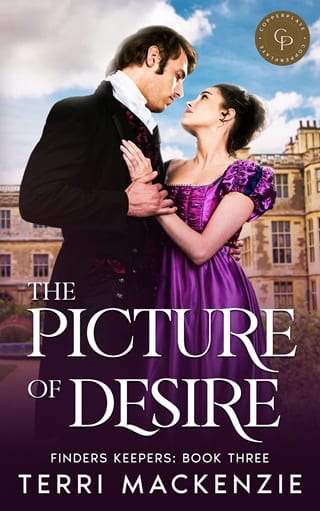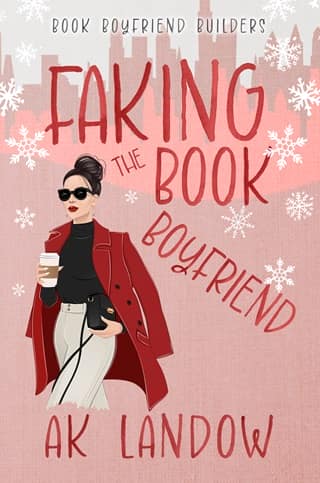Chapter Twenty-Three
THE PAST
April 1805
Louisa waited on the pavement outside the Royal Academy, praying it didn't rain as her footman maintained a sour silence behind her. According to her mother, she was meeting her friend Beatrice Lacey. Instead, she was waiting for Henry to escort her through the Royal Academy. The footman, Peter, knew as much, but he was also stepping out with Lucy, Louisa's maid, and he knew to keep in her good books, he would have to keep the true nature of this visit a secret.
A cool wind blew the scent of rain with it, and as a few drops splattered her face, she spied Henry striding towards her. Perhaps she was biased, but she thought he was probably the most handsome man in all of London. The deep navy of his waistcoat only highlighted the stern beauty of his face, softened by a mouth that could have made angels weep. Crisp, cool, and very much in control. As always.
He smiled when he saw her, and the tension she had been unaware of holding melted. "Miss Picard," he said, and she held out her hand to him. Eyes on hers, he bent and kissed her fingertips. A shiver ran through her.
She nodded at the doors of the exhibition. "I hope you're prepared."
"You make it sound as though we will be facing something more fearsome than mere art." He tucked her hand into his arm, and she picked up her skirts as they walked through the archways into the New Somerset House where the exhibition was currently being held.
The Summer Exhibition was usually held for a month, and this was the second year running that she'd had a piece accepted. As they walked through the large, open rooms, paintings displayed on all sides, she released a sigh of relief. Being here made her feel at ease all over again, as though she had come home.
"Am I supposed to know which is yours?" he murmured in her ear.
"Not yet. Wait." She came to one. "What do you think of this?"
He stared at the large landscape, capturing distant workers shirtless under the hot sun. A river wound in the foreground, and in the distance there were hills.
"Is this yours?" he asked, looking at the workers.
She laughed. "No. See here how the perspective is wrong? The angle of the river against the men here?"
"I see," he said, although his tone was doubtful. "So you don't think it's good?"
"The brushwork is excellent," she allowed. "And the colours are vivid, if not always accurate. It makes for a striking picture."
"But you don't like it?"
"No."
"Is that because you believe art should exactly replicate its subject?"
She grinned, having hoped he would ask that question. "What is art if not a mirror?" she asked.
"What is art if not truth?" he countered.
"Must truth always be a direct replica of the world? Or is it heart, intention?" She led him along to her favourite bench in Somerset House. "Now, what think you to this?"
He looked at it carefully, head tilted to the side. "It has a particular style to it," he said at last.
"And what do you think of the style?"
The painting was of a young lady painting the portrait of another. A brush was in her delicate hand, and her eyes were focused on the other lady's soft, blurred face. It was evident that she had been commissioned for this portrait. A small dog was curled at her feet.
" Domestic Bliss ," Henry read, and frowned.
"All the colours indicate domesticity," she said, looking up at him. "And see the happiness of the artist?"
"It is a singular view of domesticity." He glanced at her, the beginnings of a smile quirking his mouth. "I wonder if that is deliberate."
"I expect so."
"Tell me, Louisa. Did you paint this?"
"My mother doesn't know," she said, looking up at the painting. "Frankly, I'm amazed it was ever accepted. It has, as you might imagine, sparked some dialogue."
"Yes," he said dryly. "I can imagine."
A party of ladies came to stand beside them, and she lowered her voice. "So many people believe a woman's only value is connected to the children she bears." The thought made something rise in her throat. She had given children little thought, save for the fact that she felt nothing when she saw others', but her body rebelled at the idea she was worth nothing more than to be a mother.
"Is that why you brought me here?" he asked, looking up at her painting again.
"Painted by a spinster, no doubt," a lady remarked to one side. "And with a singularly weak hand."
"One cannot but think that if she had married, she would not be obliged to paint." This lady said the words with disdain. "Poor girl. I feel sorry for her. Painting is all very well, of course, but for it to be one's sole source of joy? Well. She clearly hasn't lived."
"No indeed," the first agreed.
Ire rose in Louisa's chest, but Henry's hand closed around her elbow. "You cannot throw a pebble into the ocean and expect the tides to change," he murmured.
There was nothing she could do but simmer in annoyance, and she hated her impotence. Her initials were on the paintings; if one truly tried, they would be able to identify her.
As it was, no one ever looked close enough to care. After all, she was only a woman. Nobody of importance.
The air suddenly felt stifling, and she sucked in a breath. This had felt like a home from home, but although she hated that another's opinion could affect her like this, there was a pit at the base of her stomach.
"Intriguing," a gentleman said from their other side. His frown deepened as he looked at her painting, and his mouth twisted to one side. "Fortunate, I think, that most do not view domesticity in this way, don't you agree?" he asked, looking at her.
Louisa tilted her head at him. He was dressed in a cheap suit, and she didn't recognise him; likely they did not walk in the same circles. "Do you not think she appears happy?"
His nose wrinkled. "I was more thinking for the sake of mankind."
Henry let out a bark of laughter. "You mean it would be unfortunate for men if their wives wanted something other than marriage?"
"Society would cease to function."
"Why?" Louisa asked pleasantly, but she could feel that familiar tingle of anger inside her gut. "Do men want nothing more than to marry?"
"Men cannot bear children," he said.
"Perhaps not," Louisa said, "but they certainly assist in producing them. You could argue, in fact, that there would not be any children at all if it were not for the work of men."
The man's cold grey eyes rested on her for a second, a flicker of interest in their depths. "An interesting perspective, Miss . . .?"
"Miss Louisa Picard," she said, extending a hand. "And you are?"
"Mr Knight."
"Well then, Mr Knight. I feel obliged to point out that I have not offered an interesting perspective, but a fact of nature. Do you dispute that men are necessary in the conceiving of children?"
"This is hardly a proper conversation to be having with a stranger," Henry said in her ear.
Of course he would think so, deeply uncomfortable with the discussion of intimacy as he was. She looked up into his face and saw not just discomfort but genuine concern.
"How enlightening," Mr Knight said gravely. "And do you consider yourself an expert on the matter?"
"I think anyone with an approximate understanding of human biology would be enough of an expert to state that fact unequivocally," Henry said, one hand still on her arm. His fingers were tight, and she wondered at his hold until she saw the calculating look in Mr Knight's eyes.
"Ah," Mr Knight said, looking at Henry. "I do not believe we've met, sir."
"Lord Eynsham," Henry said shortly. "Forgive me, but we should really be going. Good day."
A young lady bounded up to Mr Knight, rosy cheeks aglow and grey eyes dancing with unrestrained mirth. "I told you, Vincent, coming here is not to discuss the merit of art, but to have fun. Do excuse my brother," she said to them. The first thing that Louisa noticed about her was the freedom of her expression, so different from the carefully blank faces of the ladies in the ton . Her fingers itched to paint her.
"There is nothing to excuse," she said at once. "He was merely discussing the merits of female domesticity."
The girl glanced at the painting for a moment, but it was clear she saw nothing to capture her attention. "Yes, it is droll, I suppose, to think domesticity is a painting and a dog," she said, and dismissed it altogether. "Come, Vincent. I must have you meet my friend. Pray excuse us for leaving so rudely, and forgive my brother for his tactlessness."
Mr Knight's calculating expression dissolved into a genuine smile at his sister's urging, and he tipped his hat to them as he left, dragged away to another party. A somewhat boisterous one, and exceedingly merry.
Henry looked down at her seriously, then back at her controversial painting. "Perhaps, for your standing in Society, you should reconsider telling people your name when you are standing in front of a divisive painting."
Something sank inside her. "So you disapprove?"
"Of the sentiment?" He glanced at her, and she saw the corner of a small smile. "Not in the slightest. But I would not call myself usual among men. Another gentleman may not feel the same way, and if it comes out that you are the artist, things may become difficult for you."
Usually, a woman could not be both a lady and an artist; she had to choose one or the other.
"If I want to claim this as my own," she said, the feeling of uncertainty rising in her chest, a black tide that threatened to swallow her pride. "Would you still want to marry me?"
He took her hand, thumb swiping over her glove. "Louisa, my love." His voice was warm, but his eyes were solemn, dark-ringed and drawing her to him like a fly to honey. "Nothing could stop me from wanting to marry you."
 Fullepub
Fullepub 



